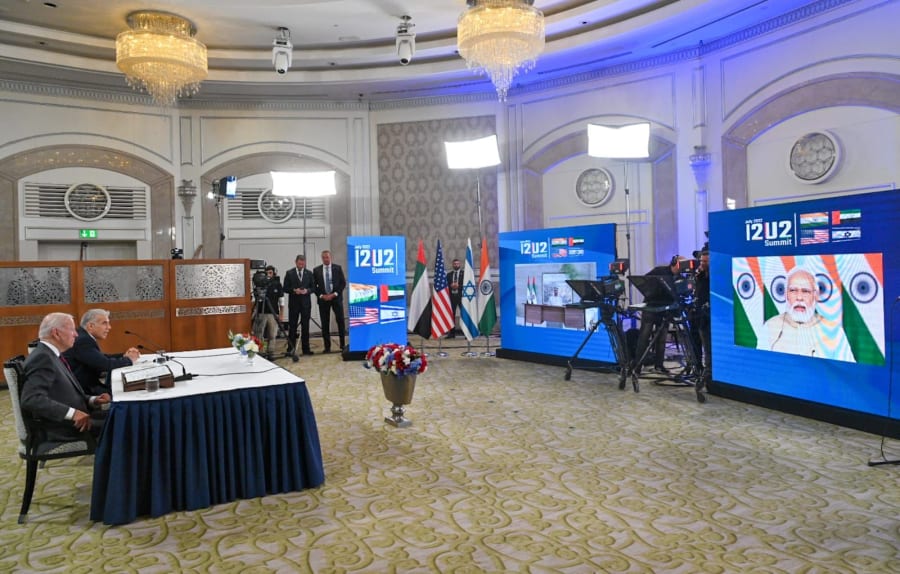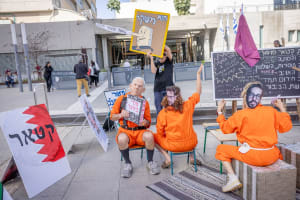I2U2 Virtual Summit results in announcement of collaboration and investment in agriculture and energy projects between the four countries
The four-nation virtual summit in Jerusalem on Thursday was attended by the leaders of Israel, India, the U.S. and the UAE

Israel, India, the United States and the United Arab Emirates announced two collaborative projects in the food security and clean energy sectors after meeting on Thursday at the I2U2 Virtual Summit.
Thursday’s joint statement following the gathering said the I2U2 countries will aim to “harness the vibrancy of our societies and entrepreneurial spirit to tackle some of the greatest challenges confronting our world, with a particular focus on joint investments and new initiatives in water, energy, transportation, space, health and food security.”
The four-nation virtual summit was convened during U.S. President Joe Biden’s visit to Jerusalem this week and brought the U.S. leader together with Israeli Prime Minister Yair Lapid, UAE President Mohamed bin Zayed (MBZ) and Indian Prime Minister Narendra Modi. It was the highest-level gathering to date of the newly-formed I2U2 – the group initials representing the first letter of the countries involved.
In a joint statement, the countries announced that the two projects are part of a “long-term strategic partnership…[to] improve the movement of people and goods across hemispheres and increase sustainability…[through] collaborative science and technology partnerships.”
The I2U2 leaders discussed ways to advance joint financial opportunities and establish connections between start-ups to address global challenges, highlighting food security and clean energy.
Regard the development of critical emerging and green tech, the I2U2 countries will also “utilize their respective private sectors to advance low carbon development pathways, improve public health and access to vaccines, jointly create new solutions for waste treatment and promote the development of green technologies,” the statement said.
“We need to think in new terms when it comes to energy, food security, water tech, defense and trade,” Lapid said. “In the 21st century, challenges are local but solutions are global.”
During the gathering the leaders specifically “discussed innovative ways to ensure longer-term, more diversified food production and food delivery systems that can better manage global food shocks,” according to a media source. Lapid highlighted, in particular, the food security crisis resulting from the Russian invasion of Ukraine, adding that the food corridor between India and the UAE is a "clear...solution to a problem we are all facing.”
The UAE plans to invest $2 billion in order to develop a series of food parks across India which will employ climate-smart technologies to reduce food waste and spoilage, conserve fresh water and utilize renewable energy sources. India will provide land for the project and facilitate integration with farmers into the food parks. These investments are designed to maximize crop yields, thereby increasing global food supply.
Companies in India are about to embark upon a joint venture towards clean energy where the nation hopes to reach its goal of 500 gigawatts (GW) of non-fossil fuel capacity by 2030, transforming the country into a global hub for renewable energy. In addition, the I2U2 initiative plans to create a hybrid renewable energy project in Gujarat, India, which would comprise 300 megawatts (MW) of wind and solar capacity along with a battery energy storage system.
“It is clear that both the vision and agenda of I2U2 are progressive and practical,” the Indian premier said.
Modi also expressed interest in developing a climate initiative with the U.S., Israel and the UAE as a member of the Agriculture Innovation Mission for Climate (AIM Climate).
“Our challenge together is to deliver real results that people can feel in their everyday lives,” Biden said. “We can do a great deal if we stick together,” the U.S. president affirmed, indicating that he intends to stay engaged in I2U2 innovation and development.
The leaders emphasized their support for Israel’s integration in the region, drawing a connection between the agreements and forums such as the I2U2. They also commended other newly-formed regional gatherings, including the Negev Forum, which is comprised of Israel, the UAE, Bahrain, Morocco, Egypt and the U.S.
U.S. National Security Advisor Jake Sullivan said, “We think I2U2 can become a feature of the broader region, just as the Quad has become a central pillar of the Indo-Pacific strategy of the United States,” referring to the security dialogue the U.S. has with India, Australia and Japan.
“I also hope that our quartet will be a model for those who desire peace and prosperity,” MBZ said, representing the UAE as one of the Abraham Accords partners with Israel.

The All Israel News Staff is a team of journalists in Israel.













